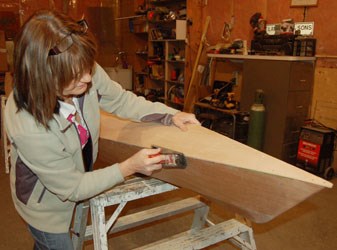Handy people, as well as not-so-handy people, can have access to a space for working, learning and sharing in community-building of another kind.
Founder of the Helping Hands organization, Scott Lawrence of Lawrence Environmental, has opened the doors of his shop on First Avenue southwest every Thursday evening for just over a year.
Since his company uses trailers at each job site, the shop is virtually unused during regular business hours. This gave Scott Lawrence the idea to make the space available, for a couple of hours each week, to those who might need shop space. Lawrence also offers himself as a resource.
"I started it for my dad and me to be able to help people in the community," said Lawrence, noting that it is a great opportunity for any family to spend time together while honing new skills.
Often joined by his friend, Brad Alexander, from 7:00 to 9:00 p.m. on Thursdays, Lawrence makes himself and his shop available to anyone who needs help fixing or building practically anything.
The projects have varied from woodworking projects to car repairs to little old ladies needing help programming their new phones! One couple, who were soon-to-be first time parents, worked together to build a change table for their baby.
"We had a guy come and rebuild an original horse-drawn grain truck," said Lawrence. "That was pretty cool."
The space sharing is completely free of charge to anyone who needs to use it. If someone feels compelled to compensate Lawrence for his help, he asks that they make a donation instead. All donations go toward another one of his special projects.
Nearly two years ago, Lawrence founded a breakfast program called Feed the Children, which benefits the kids living on the Big Stone Indian Reserve in La Ronge, Saskatchewan, partnering with Pastor Angus Ross. The organization carries no overhead or administration costs and, therefore, its proceeds go toward the purchase of breakfast food for school children.
"Any donations are tax deductible and one hundred per cent of proceeds buy food," he said, noting that the program allows the kids to see 'that somebody else in this world cares.'
The Weyburn Free Methodist Youth Group has worked on a few projects with Helping Hands. One time, the kids built a storage shed. They have helped Lawrence build some work tables. They also fixed up an unwanted dresser, which was then donated to someone who needed it.
Lawrence's vision is to invite every youth group in the area to come and work on projects, such as refurbishing furniture that can, in turn, be donated.
He noted that the principle of Helping Hands is to 'love your neighbour'.
"Loving your neighbour means reaching out and helping when you can," explained Lawrence. "So, we're just trying to find different ways to be able to reach out."
Lawrence hopes to be able to change the popular skeptic's mentality of not accepting help. He noted that many people ask 'what's the catch?'
"When people come to our shop, we help them because we care. There's no catch," he said.
Lawrence noted that when someone comes in for help fixing something, they get to learn how to use the tools themselves. This is probably why, in general, more women attend Helping Hands.
Norma Rosengren is one of four women who've taken on a rather big project - building their own kayaks.
The ladies have regularly attended a women's retreat in North Dakota for a number of years. Their kayak instructor, Todd Stutzman, encouraged them to make their own. Stutzman and his wife Roxanne came to Weyburn earlier this month to teach the ladies his method. The project has taken about 70 hours so far and they are each about eight hours away from being completed.
Fortunately, one great boon to their project is that one of the ladies has a carpenter for a husband.
The wooden kayaks are lighter weight, being about half as heavy as the plastic ones, which is especially appealing to lady kayakers.
"I just found that, in the water, when you would stop paddling, you would just seem to glide forever across the lake," said Rosengren. "The other ones were nice too, but his (handmade kayaks) were pretty special."
The kayaks are made of 'Okoume', which is marine-grade mahogany plywood, grown in Honduras, manufactured in Europe and distributed by a Canadian company aptly called Noah's.
The Okoume kayaks are longer than pre-manufactured ones, allowing for two hatches, so the user can pack enough dry sack supplies for a weekend trip.
Without the Helping Hands shop, Rosengren said that it may not have been possible to complete the project by herself in so few hours.
"It would have taken me a year to do it by myself, probably," she said, noting that having experienced carpenters on hand, as well as the space to house all four kayaks throughout their construction, has made the entire process go much easier for these women.
Helping Hands runs year-round, with the exception of the summer holiday months. The shop is located at 41 First Avenue southwest.




